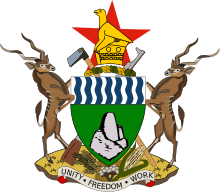Zimbabwe Electoral Commission
 |
| This article is part of a series on the politics and government of Zimbabwe |
|
Legislature |
|
Judiciary |
|
|
National symbols |
Zimbabwe Electoral Commission (ZEC) is a nominally independent organisation which controls elections at all levels of Zimbabwe politics. It was established by an Act of the Parliament in 2004, with influence from its predecessor, the Electoral Supervisory Commission as well as the Southern African Development Community.[1]
Official functions
- The official functions of the Zimbabwe Electoral Commission are:
- Preparing for, conducting and supervising all Elections in Zimbabwe and referendums.
- Ensuring that elections are free, fair, transparent, and perfectly in accordance with the law.
- Directing and controlling voter registration.
- Gathering voters rolls and registers
- Guarding and maintaining voters rolls and registers.
- Designing and distributing ballot papers, setting up ballot boxes and placing polling stations.
- Supervising the registration of voters under the Electoral Law
- delimiting Electoral Boundaries.
- Instructing the registrar general of voters of his functions under the law.
- Instructing employees of the state or local authorities of their responsibilities in ensuring free, fair, proper, and fair conduct in any elections or referendums.
-
- Providing voter education which is:
- accurate, adequate and not biased to any political party or candidate
- in compliance with the Zimbabwe Electoral Commission Act
- is not carried out by any foreign organisation of any kind (any local Zimbabwean person may be appointed to carry out voter education, although the materials used are approved by the ZEC, to ensure impartiality, uniformity and suitability.
- Keeping the public informed about:
- All candidates and affiliated political parties contesting an election, and supporting or opposing any question put to a referendum
- Voting and the results of votes, and all matters concerning the work of the commission as well as the electoral process.
- The exercise of any other function imposed on the commission by acts of parliament.[2]
The Commission
The Commission comprises 8 Commissioners who are appointed by the President. The Chairperson is appointed after consultation with the judicial service commission, and the other 7 are appointed from a list of nominees supplied by the Parliamentary Committee on Standing Rules and Orders. There is also a Chief Elections Officer charged with the day-to-day running of the Commission.[2][3]
| Hon Justice Rita Makarau | Chairperson |
| Joyce Kazembe | Deputy Chairperson |
| Lovemore Sekeramay | Chief Elections Officer |
| Sarah Kachingwe | Commissioner |
| George Kahari | Commissioner |
| Vivian Ncube | Commissioner |
| Jonathon Siyachitema | Commissioner |
| Theophilus Gambe | Commissioner |
Criticism
On numerous occasions the ZEC has been dubbed biased and their independence questioned by opposition parties as well as international Independent media.[4]
Political violence and intimidation
Morgan Tsvangirai of the Movement for Democratic Change party believes that the June 2008 elections could not be conducted fairly due to election violence which Tsvangirai believes was state-sponsored, and in most cases performed by the state militia. He also claims that members of the police, Zimbabwe National Army, and prison officers were being "forced" to vote Zanu-PF. According to Tsvangirai the ZEC has failed to condemn whisperings among Zanu-PF officials that president Robert Mugabe will continue to rule regardless of electoral results, which has encouraged groups of War Veterans to provoke violence.[5]
Media
MDC also claim that the Commission fails to conduct it's duties of regulation efficiently as it has failed to act on the Zimbabwean media, such as the state-run Herald newspaper, which they are required to do in their mandate. Critics state that this information is completely one-sided against the opposition and in favour of Robert Mugabe and the incumbent Zanu-PF party, as well as being incorrect, and inciting racial, religious and political hatred, and blame the Commission for failing to monitor this.[4]
See also
References
- ↑ Zimbabwe Electoral Commission Archived 12 February 2012 at the Wayback Machine.
- 1 2 Zimbabwe Electoral Commission Archived 21 August 2008 at the Wayback Machine.
- ↑ George Gambe new commissioner Archived 7 July 2011 at the Wayback Machine.
- 1 2 ZEC responsible Archived 22 May 2011 at the Wayback Machine.
- ↑ This is Zimbabwe » Blog Archive » Morgan Tsvangirai’s letter to ZEC Archived 30 June 2008 at the Wayback Machine.